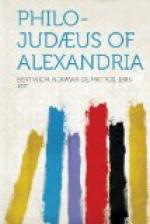laying them up in your hearts, guard them as a most
excellent treasure in which the noblest of possessions
is stored, the knowledge, namely, of the First Cause
and of virtue, and moreover of what they generate."[338]
These mysteries, it is not unlikely, represent according
to some scholars the [Hebrew: sod] of the Talmudical
rabbis, which was elaborately developed in the Zohar
and kindred writings. Be this as it may, Philo’s
religious intensity expresses the spirit of the Cabbalists,
his mystic soaring is the prototype of their theosophical
ecstasies; his persistent declaration that God encloses
the universe, but is Himself not enclosed by anything,
contains the root of their conception of the En Sof
([Hebrew: ’yn sof]),[339] his Logos-idealism,
with its Divine effluences, which are the true causes
of all changes, physical and mental, is companion to
their system of [Hebrew: ’olmim] and [Hebrew:
sfirot], emanations and spheres. His fancies
about sex and the struggle between a male and female
principle in all things[340] are a constant theme of
their teachers, and form a special section of their
wisdom, [Hebrew: sof htsrog], the mystery of
generation. His conception of the Logos as the
heavenly archetype of the human race, the “Man-himself,”
is the Platonic counterpart of their [Hebrew:
adm kdmon], or “primal man,” who is known
in the ancient allegorizing of the Song of Songs.
His number-mysticism and his speech-idealism reappear
more crudely, but not obscurely, in their ideas of
creative letters, of which the cosmogony by the twenty-two
letters of the Hebrew alphabet in the Sefer Yezirah
is typical. Finally, his teachings of ecstasy
and Divine possession are repeated in divers ways
in their descriptions of the pious life ([Hebrew:
hnanot]).
Philo, indeed, viewed from the Jewish standpoint,
is the Hellenizer not only of the law but also of
the Cabbalah, the philosophical adapter of the secret
traditional wisdom of his ancestors. He brings
it into close relation with Platonism and purifies
it; he clears away its anthropomorphisms and superstitious
fantasies, or rather he raises them into idealistic
conceptions and sublime exaltations of the soul.
By his deep knowledge of the intellectual ideas of
Greece he refined the strange compound of lofty imagination
and popular fancy, and raised it to a higher value.
Plato and the Cabbalah represent the same mystic spirit
in different degrees of intellectual sublimity and
religious aspiration; Philo endeavored to unite the
two manifestations. He lived in a markedly non-rational
age given over to mystical speculation; and Alexandria
especially, by her cosmopolitan character, “furnished
the soil and seed which formed the mystic philosophy
that knew how to blend the wisdom and folly of the
ages."[341] Through the mass of apocalyptic literature
that was poured forth in the first centuries of the
common era, through the later books of the Apocrypha,
through the Sefer Yezirah of the ninth and the Zohar
of the thirteenth century, and through the vast literature
inspired by these books, run the ideas that composed
Philo’s mystic theology. Philo himself
was unknown, but his religious interpretation of Platonism
had entered into the world’s thought, and inspired
the mystics of his own race as well as of the Christian
world.




